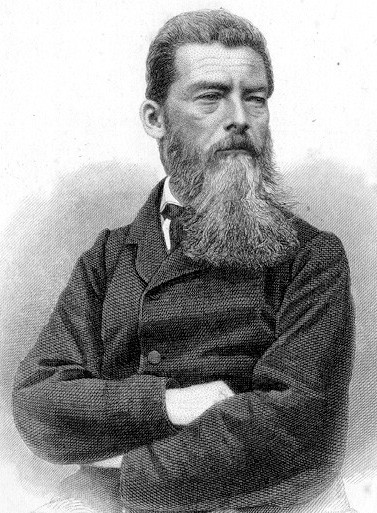More languages
More actions
Spookfessor (talk | contribs) m (Added categories) Tag: Visual edit |
m (Portrait added to infobox) Tag: Visual edit |
||
| (One intermediate revision by one other user not shown) | |||
| Line 1: | Line 1: | ||
{{Adapted article}} | {{Adapted article}}{{Infobox philosopher|name=Ludwig Feuerbach|birth_name=Ludwig Andreas von Feuerbach|birth_date=28 July 1804|birth_place=Landshut, Electorate of Bavaria|death_date=13 September 1872 (aged 68)|death_place=Rechenberg, German Empire|nationality=German|school_tradition=[[Materialism]]|image=File:Feuerbach.jpg}} | ||
'''Ludwig Feuerbach''' {{Datebio|birthmonth=July|birthday=28|birthyear=1804|deathmonth=September|deathday=13|deathyear=1872}} was a German [[Materialism|materialist]] philosopher, son of a once-famous criminologist Paul-Anselme Feuerbach. Was obliged to give up his academic career because of his philosophical ideas and so lived in the countryside in straitened circumstances. From [[Young Hegelians|young Hegelianism]] he evolved to materialism. “Thought came from being, not being from thought.” Man is the product of nature; [[religion]] is the mythical reflection of human nature. “In man’s God, you can recognize man and in man you can also recognize his God; the two things are identical.” It is not God who created man, but man who created God in his image. Feuerbach’s philosophy provided the intermediary link between [[Dialectics|Hegel’s]] and [[Dialectical materialism|Marx’s]] philosophy. Although somewhere he wrote with scorn of the [[French Republic|French]] materialism of the 18th century, nevertheless, Feuerbach was in fact the restorer of 18th century materialism, with all its great merits and all its faults with its noble, proud and revolutionary hatred for all “theology” and its tendency towards [[idealism]] when explaining social acts and phenomena. | |||
'''Ludwig Feuerbach''' {{Datebio|birthmonth=July|birthday=28|birthyear=1804|deathmonth=September|deathday=13|deathyear=1872}} was a German materialist philosopher, son of a once-famous criminologist Paul-Anselme Feuerbach. Was obliged to give up his academic career because of his philosophical ideas and so lived in the countryside in straitened circumstances. From [[Young Hegelians|young Hegelianism]] he evolved to materialism. “Thought came from being, not being from thought.” Man is the product of nature; religion is the mythical reflection of human nature. “In man’s God, you can recognize man and in man you can also recognize his God; the two things are identical.” It is not God who created man, but man who created God in his image. Feuerbach’s philosophy provided the intermediary link between Hegel’s and Marx’s philosophy. Although somewhere he wrote with scorn of the French materialism of the 18th century, nevertheless, Feuerbach was in fact the restorer of 18th century materialism, with all its great merits and all its faults with its noble, proud and revolutionary hatred for all “theology” and its tendency towards idealism when explaining social acts and phenomena. | |||
[[Category:Philosophers]] | [[Category:Philosophers]] | ||
[[Category:German philosophers]] | [[Category:German philosophers]] | ||
[[Category:Young Hegelians]] | [[Category:Young Hegelians]] | ||
[[Category:Theologians]] | [[Category:Theologians]] | ||
Latest revision as of 22:29, 15 July 2024
This article is adapted from an original work. It may be also be translated from the Great Soviet Encyclopedia, EcuRed, or Baidu Baike.
Ludwig Feuerbach | |
|---|---|
 | |
| Born | Ludwig Andreas von Feuerbach 28 July 1804 Landshut, Electorate of Bavaria |
| Died | 13 September 1872 (aged 68) Rechenberg, German Empire |
| School tradition | Materialism |
| Nationality | German |
Ludwig Feuerbach (July 28, 1804 — September 13, 1872) was a German materialist philosopher, son of a once-famous criminologist Paul-Anselme Feuerbach. Was obliged to give up his academic career because of his philosophical ideas and so lived in the countryside in straitened circumstances. From young Hegelianism he evolved to materialism. “Thought came from being, not being from thought.” Man is the product of nature; religion is the mythical reflection of human nature. “In man’s God, you can recognize man and in man you can also recognize his God; the two things are identical.” It is not God who created man, but man who created God in his image. Feuerbach’s philosophy provided the intermediary link between Hegel’s and Marx’s philosophy. Although somewhere he wrote with scorn of the French materialism of the 18th century, nevertheless, Feuerbach was in fact the restorer of 18th century materialism, with all its great merits and all its faults with its noble, proud and revolutionary hatred for all “theology” and its tendency towards idealism when explaining social acts and phenomena.
